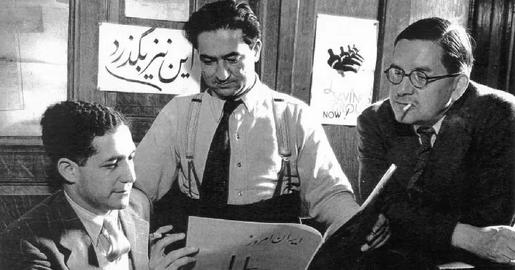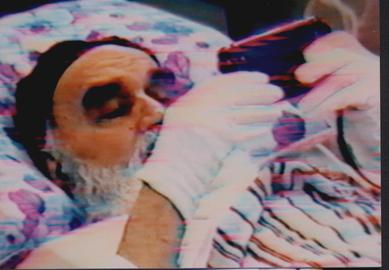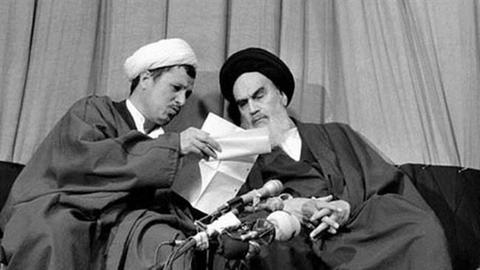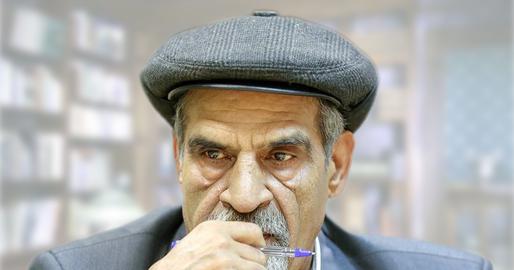The BBC’s Persian radio service, one of the oldest Persian-language media, went off the air after 82 years of broadcasting.
The radio station was a crucial source of information for Ayatollah Ruhollah Khomeini, the founder of the Islamic Republic, and other officials who relied on it for their daily political updates.
The last king of Iran, Mohammadreza Pahlavi, viewed the station with suspicion, indicating its significance for both sides.
One of Khomeini's most famous interviews was conducted by the BBC, and some consider it has played a big role in the victory of the 1979 revolution.
Despite this, the relationship between the Islamic Republic’s authorities and BBC Persian remained strained after the revolution, as it was during the monarchy.
At one point, the Supreme National Security Council of the Islamic Republic passed a resolution prohibiting officials from giving interviews to Persian-language media, including BBC Persian. Still, military officials occasionally violated the resolution and gave interviews to the station.
One of the most controversial interviews conducted by BBC’s Persian was with Ali Akbar Nateq-Nouri during the 1997 presidential election campaign.
During the presidency of Mahmoud Ahmadinejad, the government strongly criticized the BBC. But in recent years, critics of the government have also scrutinized the performance of BBC Persian.
This has created a unique atmosphere where opponents refer to the station as "Ayatollah BBC.”
Khomeini’s Interview
One of the most significant interviews with Khomeini before the 1979 Islamic revolution was conducted by the BBC, and there have been numerous debates about the radio station's role in the revolution.
Accounts suggest that even the shah was sensitive to the BBC's broadcasts. During the revolution, his last ambassador to London, Parviz Raji, objected to the airing of Khomeini's speech on November 23, 1978, which was broadcast by the BBC.
The BBC defended itself by stating that the program also covered Mohammad Reza Shah Pahlavi's statements.
After the revolution, the media in the Islamic Republic attempted to label the BBC as an opponent of the revolution, although they still recognized its role.
Akbar Hashemi Rafsanjani commented on the radio station, saying, "During the revolution, they were supporters of the shah, but the news they provided was harmful to his regime, and many times their news was also harmful to us."
Listening to BBC radio in the morning and at night became a regular practice for Khomeini and other officials of the Islamic Republic.
Listening to the BBC radio was also a part of the daily routine for other Islamic Republic officials.
BBC’s Role in Montazeri’s Dismissal
In recent years, state media have repeatedly cited scholar Ayatollah Hossein Ali Montazeri’s letter about executions, which was broadcast on BBC on March 1989, as a reason for Khomeini's decision to dismiss him from his post as chief of staff.
According to Akbar Hashemi Rafsanjani's memoirs, this issue had been ongoing for several weeks.
There are conflicting claims about the source of the letter. Government media accuse Montazeri's office, but his son (Ahmed Montazeri) has stated that those “who wanted to depose" his father "gave the letter to the BBC to pressure Ayatollah Khomeini to take action.”
Montazeri did not address this issue during his interview with BBC TV. The broadcast of this interview in 2008 sparked controversy, and the interviewer, Emaduddin Baghi, and other people involved in it were subsequently arrested.
Rafsanjani, Khamenei Were Regular Listeners
Rafsanjani mentioned the BBC in his memoir. In the section about the news coverage of the Iran-Iraq war in the 1980s, he claimed that the Islamic Republic’s successes in the conflict were downplayed.
His daughter, Fatemeh Hashemi, said that in his final years, he would listen to the BBC radio programs broadcast by satellite after prayers.
In an interview, Rafsanjani said that BBC Arabic and BBC Persian "act professionally, they have trained journalists and speakers and are well-informed in terms of sociology and public relations."
President Khatami also Listened to BBC News
Mohammad Ali Abtahi recalled that on the morning of July 9, 1999, the Office for Strengthening Unity informed him that they had attacked the dormitory of Tehran University the night before and beat up the students.
Abtahi immediately called President Mohammad Khatami's house to inform him, and the president said, "I heard from BBC radio and gave orders."
Supreme leader Ali Khamenei, Khomeini’s successor, has occasionally reacted to BBC’s reports and directly attacked the broadcaster in several of his speeches.
The banning of BBC Persian TV
The relationship between the Islamic Republic and BBC Persian worsened following the launch of BBC Persian Television during Ahmadinejad’s presidency.
The Ministry of Culture and Guidance declared that the network had no right to operate.
After the 2009 wave of protests, the Islamic Republic warned against cooperating with the BBC and arrested those who gave interviews to the media outlet.
In recent years, some opponents of the Iranian government criticized BBC Persian's programs, claiming that they favored the ruling system in Iran.
In a leaked audio clip, the Islamic Revolutionary Guard Corps claimed responsibility for the hashtag "Ayatollah BBC," which aimed to damage the network's credibility.
visit the accountability section
In this section of Iran Wire, you can contact the officials and launch your campaign for various problems
































comments